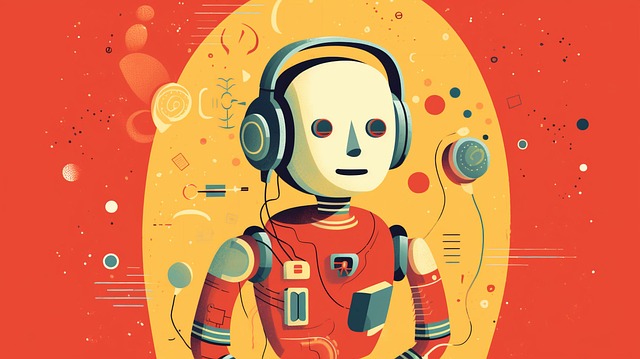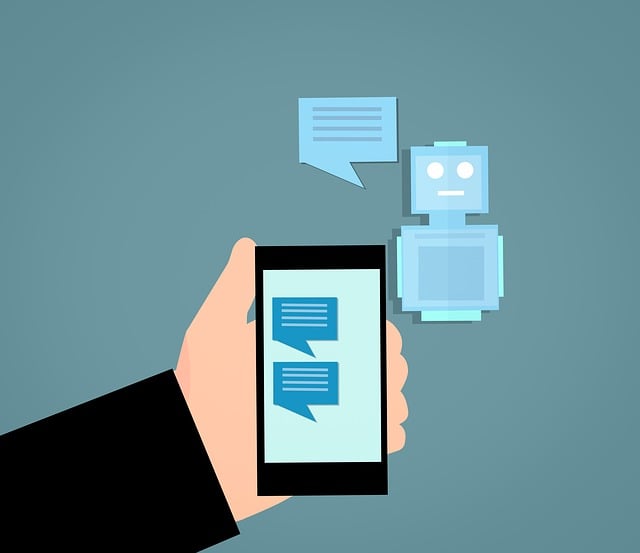AI Transforms Content Personalization for Customer Delight

AI customer service revolutionizes user interactions through personalized content delivery, leveragi…….
We are At Your Service
In the digital age, personalization has become a powerful tool for businesses aiming to create compelling and tailored user experiences. “Personalization in AI: Tailoring User Experiences” refers to the use of artificial intelligence (AI) technologies to deliver customized content, products, or services to individual users based on their preferences, behaviors, and data inputs. This strategy goes beyond generic marketing approaches, offering a level of customization that fosters deeper engagement, satisfaction, and loyalty among users. The following article explores the multifaceted world of AI personalization, delving into its definition, global impact, technological foundations, regulatory frameworks, challenges, successful applications, and future prospects. By examining these aspects, we aim to provide a comprehensive understanding of why this technology is reshaping industries worldwide and how it continues to evolve.
At its core, personalization involves using AI algorithms and machine learning models to analyze vast amounts of user data, enabling businesses to predict and cater to individual preferences. This process goes beyond simple product recommendations by incorporating various user interactions, behaviors, demographics, and psychographics to create highly tailored experiences. For example, a streaming platform might use AI to suggest movies based not only on previous viewing history but also on the user’s preferred genre, actors they’ve shown interest in, and even their mood as inferred from metadata associated with their watching habits.
Personalization in AI typically comprises several key components:
Data Collection: Gathering comprehensive user data through various sources such as website interactions, purchase history, social media activities, and surveys.
Data Analysis: Employing AI algorithms to process and analyze the collected data, identifying patterns, preferences, and trends. Techniques like clustering, collaborative filtering, and content-based filtering are commonly used for this purpose.
Profile Creation: Creating detailed user profiles that encompass demographics, interests, behaviors, and preferences, enabling personalized interactions.
Content or Service Personalization: Using the insights derived from data analysis to deliver customized content, product recommendations, or services tailored to each user’s unique profile.
Real-time Adaptation: Continuously updating user profiles and personalizations based on new interactions, ensuring that experiences remain relevant and dynamic over time.
The concept of personalization in AI has evolved significantly over the past few decades. Early forms of personalization were manual and limited to basic customer segmentation based on demographics and purchase history. With the advent of powerful computing resources and advanced algorithms in the 2000s, however, companies began exploring data-driven approaches to personalization. The rise of e-commerce and digital media platforms accelerated this trend, as businesses sought ways to engage users more effectively in an increasingly competitive market.
Today, AI and machine learning have transformed personalization from a simple marketing strategy into a dynamic, adaptive process that can anticipate user needs and preferences with remarkable accuracy. This evolution has been fueled by advancements in data science, improved algorithms, and the increasing availability of diverse user data.
Personalization in AI is a global phenomenon, impacting industries across various regions and sectors. From e-commerce and media streaming to healthcare and education, businesses worldwide are leveraging AI personalization to enhance user experiences, increase engagement, and drive growth. For instance, companies like Amazon (US) and Alibaba (China) have pioneered personalized product recommendations, while Netflix (US) and Hotstar (India) have transformed entertainment by offering tailored content suggestions.
Several trends are currently shaping the landscape of AI personalization:
Deep Learning Advancements: The use of deep neural networks and natural language processing is enabling more sophisticated user profiling and prediction models, leading to enhanced personalization across various applications.
Real-time Personalization: As users expect instant and relevant interactions, businesses are focusing on real-time data processing and personalization, ensuring that recommendations and experiences are up-to-date and aligned with current user preferences.
Omnichannel Experiences: With customers interacting through multiple channels (web, mobile, social media), companies are striving to create seamless, omnichannel personalization experiences, maintaining consistency and relevance across all touchpoints.
Ethical and Privacy Concerns: Growing awareness of data privacy issues has prompted businesses to prioritize ethical AI practices, transparent data handling, and user consent in their personalization strategies.
Cultural Sensitivity: As global audiences become more diverse, companies are investing in culturally sensitive AI models that respect regional preferences, language variations, and cultural nuances.
Different regions have unique approaches and impacts on AI personalization:
North America: Known for its early adoption of technology, North American businesses heavily invest in AI, particularly in e-commerce and media streaming sectors. Personalization here often focuses on hyper-tailored content and product recommendations.
Europe: With stringent data privacy laws like GDPR, Europe takes a more cautious yet innovative approach to AI personalization. Companies emphasize transparency, user consent, and ethical use of data while delivering personalized experiences.
Asia Pacific: Led by tech giants like China’s Alibaba and Tencent, the Asia Pacific region is witnessing rapid integration of AI personalization across various industries, including retail, travel, and entertainment.
Middle East & Africa: These regions are experiencing a surge in mobile adoption and digital transformation, providing ample opportunities for AI-driven personalization, especially in banking, healthcare, and media.
AI-driven personalization has become a competitive differentiator in many industries, influencing market dynamics in several ways:
Increased Customer Loyalty: Personalized experiences lead to higher customer satisfaction, retention, and loyalty, reducing churn rates and fostering long-term relationships.
Higher Revenue Potential: Targeted recommendations can boost sales by increasing the likelihood of purchases, cross-selling, and upselling opportunities. For instance, Amazon’s personalized product suggestions have been credited with significantly contributing to its revenue growth.
Cost Savings: By optimizing inventory, reducing waste, and minimizing customer support costs through efficient personalization, businesses can improve overall operational efficiency.
The global AI market, including personalization technologies, is experiencing substantial growth:
AI personalization plays a pivotal role in shaping economic systems:
Several technological advancements have propelled the capabilities of AI personalization:
Deep Learning and Neural Networks: These technologies enable more complex user profiling, allowing for nuanced predictions and recommendations based on subtle patterns in user data.
Natural Language Processing (NLP): NLP advances have improved conversational AI systems, making it possible to deliver personalized interactions through chatbots and virtual assistants that understand context and intent.
Computer Vision: In industries like fashion and retail, computer vision algorithms analyze user imagery to provide personalized product suggestions, enhancing the online shopping experience.
Reinforcement Learning: This technique enables AI models to learn from user feedback loops, continually improving personalization by adapting to individual preferences over time.
AI personalization has left a profound impact across diverse sectors:
E-commerce: Personalized product recommendations have revolutionized online retail, increasing sales and customer satisfaction. Websites like Amazon and eBay use advanced algorithms to offer tailored product suggestions based on browsing history, purchase behavior, and preferences.
Media Streaming: Services like Netflix and Disney+ leverage AI to suggest content, improving viewer engagement and retention. These platforms analyze viewing patterns, likes, dislikes, and even metadata associated with videos to deliver personalized recommendations.
Healthcare: AI-driven personalization in healthcare is transforming patient care, from precise medication recommendations based on genetic profiles to tailored diet plans and exercise routines.
Education: Personalized learning experiences enable adaptive learning platforms to tailor content and instruction to individual student needs, enhancing learning outcomes.
The future of AI personalization holds immense potential across various domains:
Immersive Experiences: With the rise of virtual reality (VR) and augmented reality (AR), AI can create highly immersive and personalized experiences in gaming, entertainment, and even training simulations.
Predictive Analytics: Advanced predictive models will enable businesses to anticipate user needs and preferences before they even arise, delivering proactive personalization that enhances customer satisfaction.
Cross-Industry Personalization: As data becomes more interconnected, AI personalization will become more seamless across different industries and touchpoints, creating a cohesive and consistent user experience throughout their digital journey.
The rapid development of AI personalization has led to various policies and regulations worldwide aimed at addressing ethical concerns, ensuring data privacy, and promoting responsible AI use:
General Data Protection Regulation (GDPR): Enforced in the European Union, GDPR imposes stringent rules on data collection, processing, and storage, emphasizing user consent and rights over personal data. This has significant implications for AI personalization practices, particularly regarding data handling and transparency.
California Consumer Privacy Act (CCPA): CCPA grants California residents enhanced privacy rights regarding their personal information, including the right to know what data is collected about them and to delete it. Businesses must ensure transparency in their data collection and use practices for personalized services.
Ethical Guidelines: Many countries have issued ethical guidelines for AI development and deployment, focusing on fairness, accountability, transparency, and non-discrimination. These guidelines influence how businesses design and implement personalization systems to ensure they treat users ethically and without bias.
Legislative frameworks worldwide are evolving to keep pace with the rapid advancements in AI:
National AI Strategies: Several countries have developed national strategies for AI development, outlining research priorities, ethical guidelines, and regulatory approaches. These strategies often address the responsible use of AI in areas like healthcare, education, and law enforcement, which include personalization applications.
Industry-Specific Regulations: Beyond general data privacy laws, specific industries are subject to regulations that impact AI personalization. For example, medical devices and health tech companies must adhere to stringent regulations regarding patient data handling and the safety of personalized recommendations.
The policy and regulatory landscape significantly influences the development and deployment of AI personalization technologies:
Data Privacy Concerns: Stringent data privacy laws prompt businesses to adopt more transparent and user-centric data collection practices, ensuring that personalized experiences do not come at the cost of users’ privacy.
Ethical Considerations: Regulatory frameworks drive the development of ethical AI guidelines, encouraging companies to prioritize fairness, transparency, and accountability in their personalization algorithms to avoid potential biases and discrimination.
Standardization: Governments and industry bodies are working on establishing standards for responsible AI development, ensuring that personalization technologies evolve in a safe and reliable manner.
Despite its immense potential, AI personalization faces several challenges:
Data Quality and Availability: Personalization algorithms heavily rely on high-quality, diverse data. Incomplete or biased datasets can lead to inaccurate predictions and unfair recommendations, particularly in underrepresented demographics.
Ethical Concerns: AI personalization raises ethical issues, including privacy invasion, algorithmic bias, and the potential for manipulation. For example, targeted advertising can exploit users’ interests and preferences, leading to concerns about consent and autonomy.
Technical Complexity: Developing and maintaining sophisticated AI models for personalization is a complex task, requiring advanced data science expertise and significant computational resources. This complexity can make it challenging for smaller businesses or those with limited technical capabilities.
Criticisms of AI personalization have prompted the development of strategies to address these challenges:
Bias in Data: To combat algorithmic bias, companies are adopting diverse and representative data sources, employing fairness metrics during model training, and conducting regular audits to identify and mitigate biases in their personalization systems.
Privacy Concerns: Transparent data handling practices, user consent mechanisms, and privacy-preserving techniques like differential privacy can help address privacy concerns. Businesses should also provide users with control over their data and the ability to opt out of personalized experiences.
Regulatory Compliance: Staying ahead of evolving regulations is crucial. Companies must invest in legal expertise and implement robust compliance frameworks to ensure their personalization practices align with relevant laws, such as GDPR or CCPA.
Netflix, the global streaming giant, has mastered the art of AI-driven content personalization. Its recommendation engine analyzes viewing history, ratings, and even metadata associated with videos to suggest movies and shows tailored to individual users’ preferences. This system has been instrumental in keeping subscribers engaged and has contributed significantly to Netflix’s success and market dominance.
Key Takeaways:
Amazon’s product recommendation engine is a cornerstone of its e-commerce success. By analyzing purchase history, browsing behavior, and customer reviews, Amazon offers personalized product suggestions across its vast catalog. This system has been credited with increasing sales, improving customer satisfaction, and fostering brand loyalty.
Lessons Learned:
Personalized Health Solutions (PHS) is a startup using AI to revolutionize personalized healthcare. Their platform analyzes patient data, including medical records, genetic information, and lifestyle factors, to provide tailored treatment recommendations. PHS has successfully partnered with hospitals and clinics to improve patient outcomes and reduce costs through precise, personalized medicine.
Impact:
AI personalization has emerged as a powerful force, transforming industries and shaping consumer experiences worldwide. Its potential to revolutionize business operations, enhance user engagement, and drive innovation is undeniable. However, navigating the challenges and ethical considerations associated with AI personalization is crucial for its responsible development and adoption.
As technological advancements continue apace, AI personalization will play an increasingly integral role in our digital lives, from tailored healthcare solutions to immersive entertainment experiences. By addressing data privacy concerns, embracing ethical guidelines, and leveraging regulatory frameworks, businesses can harness the full potential of AI personalization while ensuring a positive impact on society.

AI customer service revolutionizes user interactions through personalized content delivery, leveragi…….

AI assistants leverage machine learning to analyze user data for precise preference understanding, o…….

AI customer service is transforming support across industries with 24/7 chatbots and virtual assista…….

AI customer service revolutionizes business interactions by leveraging machine learning to analyze v…….

AI assistants leverage user behavior patterns revealed through interaction data to offer personalize…….

AI customer service revolutionizes business interactions by analyzing vast data for insights, enabli…….

AI customer service is transforming support with personalized, efficient solutions using advanced te…….

AI customer service revolutionizes business interactions with 24/7 support through adaptive chatbots…….

AI chatbots have advanced significantly, employing natural language processing (NLP) to comprehend u…….

AI customer service revolutionizes interactions by leveraging data for personalized solutions, enhan…….